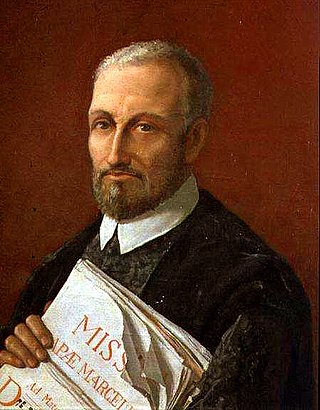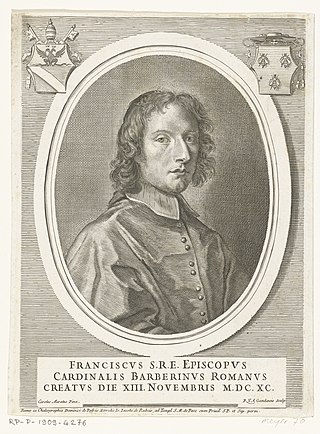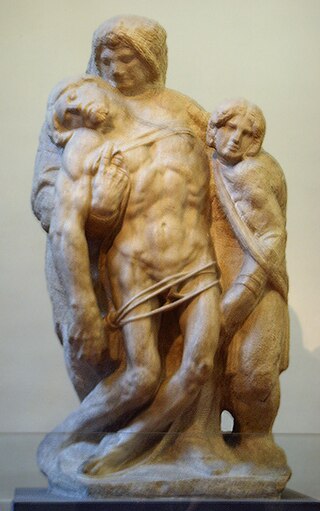Related Research Articles

Giovanni Pierluigi da Palestrina was an Italian composer of late Renaissance music. The central representative of the Roman School, with Orlande de Lassus and Tomás Luis de Victoria, Palestrina is considered the leading composer of late 16th-century Europe.

The Counter-Reformation, also sometimes called the Catholic Revival, was the period of Catholic resurgence that was initiated in response to, and as an alternative to, the Protestant Reformations at the time. It began with the Council of Trent (1545–1563) and largely ended with the conclusion of the European wars of religion in 1648. The similar term Catholic Reformation may also encompass reforms and movements within the Church in the periods immediately before Protestantism or Trent.

Palestrina is a modern Italian city and comune (municipality) with a population of about 22,000, in Lazio, about 35 kilometres east of Rome. It is connected to the latter by the Via Prenestina. It is built upon the ruins of the ancient city of Praeneste.

The Galleria dell'Accademia di Firenze, or "Gallery of the Academy of Florence", is an art museum in Florence, Italy. It is best known as the home of Michelangelo's sculpture David. It also has other sculptures by Michelangelo and a large collection of paintings by Florentine artists, mostly from the period 1300–1600. It is smaller and more specialized than the Uffizi, the main art museum in Florence. It adjoins the Accademia di Belle Arti or academy of fine arts of Florence, but despite the name has no other connection with it.
Margherita Colonna, was a member of the Colonna family, which was notable in Italian history for centuries. She lived as a nun, with her followers.

The Roman Catholic Suburbicarian Diocese of Ostia is an ecclesiastical territory located within the Metropolitan City of Rome in Italy. It is one of the seven suburbicarian dioceses. The incumbent Bishop is cardinal Giovanni Battista Re. Since 1150, its bishop has been the Dean of the College of Cardinals. Its Cathedral is Basilica di Sant'Aurea.

Palestrina is an opera by the German composer Hans Pfitzner, first performed in 1917. The composer referred to it as a Musikalische Legende, and wrote the libretto himself, based on a legend about the Renaissance musician Giovanni Pierluigi da Palestrina, who saves the art of contrapuntal music (polyphony) for the Church in the sixteenth century through his composition of the Missa Papae Marcelli. The wider context is that of the European Reformation and the role of music in relation to it. The character of Cardinal Borromeo is depicted, and a General Congress of the Council of Trent is the centrepiece of act 2.

Missa Papae Marcelli, or Pope Marcellus Mass, is a mass sine nomine by Giovanni Pierluigi da Palestrina. It is his best-known mass, and is regarded as an archetypal example of the complex polyphony championed by Palestrina. It was sung at the papal coronation Masses.

The Suburbicarian Diocese of Palestrina is a Latin suburbicarian diocese centered on the comune of Palestrina in Italy.

The Suburbicarian Diocese of Velletri–Segni' is one of the Latin suburbicarian dioceses, Catholic dioceses in Italy close to Rome with a special status and a cardinal bishop, the bishop of Velletri–Segni. Historically, the see of Velletri was combined with the see of Ostia from 1060 to 1914.

Guarino Foscari was an Italian Catholic Augustinian canon regular and also the Cardinal-Bishop of Palestrina from December 1144 after his relative Pope Lucius II elevated him into the cardinalate.
Alain (II) de Coëtivy was a prelate from a Breton noble family. He was bishop of Avignon, Uzès, Nîmes and of Dol, titular cardinal of Santa Prassede, then cardinal-bishop of Palestrina and cardinal-bishop of Sabina. Many sources mention him as the Cardinal of Avignon.

Agapitus is venerated as a martyr saint, who died on August 18, perhaps in 274, a date that the latest editions of the Roman Martyrology say is uncertain.

Taddeo Barberini (1603–1647) was an Italian nobleman of the House of Barberini who became Prince of Palestrina and Gonfalonier of the Church; commander of the Papal Army. He was a nephew of Pope Urban VIII and brother of Cardinals Francesco Barberini and Antonio Barberini. Thanks to their uncle's famous nepotism, the brothers shaped 17th-century Italian politics, religion, art, music and architecture.

Francesco Barberini, iuniore was an Italian Cardinal of the family of Pope Urban VIII (1623–1644) and of the Princes of Palestrina.
The Cappella Giulia, officially the Reverend Musical Chapel Julia of the Sacrosanct Papal Basilica of Saint Peter in the Vatican, is the choir of St. Peter's Basilica that sings for all solemn functions of the Vatican Chapter, such as Holy Mass, Lauds, and Vespers, when these are not celebrated by the Pope. The choir has played an important role as an interpreter and a proponent of Gregorian chant and sacred polyphony.

The Palestrina Pietà is a marble sculpture of the Italian Renaissance, dating from c. 1555 and now in the Galleria dell'Accademia, Florence. It was formerly attributed to Michelangelo, but now it is mostly considered to have been completed by someone else, such as Niccolò Menghini or Gian Lorenzo Bernini. According to the Galleria dell'Accademia, the sculpture's "attribution to the master is still somehow controversial".

Iliev Glacier is the 5 km long and 1.5 km wide glacier located within the Lassus Mountains, situated in the northern portion of Alexander Island, Antarctica. It drains the northwest slopes of Mount Wilbye, the east slopes of Vittoria Buttress and the west slopes of Galerius Peak to flow into Lazarev Bay just south of the terminus of Palestrina Glacier.

Palestrina Cathedral is a Roman Catholic cathedral located in Palestrina, in the region of Lazio, Italy. It is the episcopal seat of the Suburbicarian Diocese of Palestrina, and dedicated to Saint Agapitus.